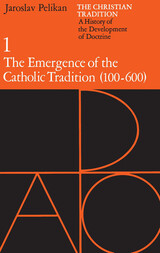
"Pelikan's The Christian Tradition [is] a series for which they must have coined words like 'magisterial'."—Martin Marty, Commonweal
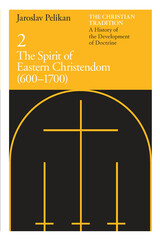
"It is a pleasure to salute this masterpiece of exposition. . . . The book flows like a great river, slipping easily past landscapes of the utmost diversity—the great Christological controversies of the seventh century, the debate on icons in the eighth and ninth, attitudes to Jews, to Muslims, to the dualistic heresies of the high Middle Ages, to the post-Reformation churches of Western Europe. . . . His book succeeds in being a study of the Eastern Christian religion as a whole."—Peter Brown and Sabine MacCormack, New York Review of Books
"The second volume of Professor Pelikan's monumental work on The Christian Tradition is the most comprehensive historical treatment of Eastern Christian thought from 600 to 1700, written in recent years. . . . Pelikan's reinterpretation is a major scholarly and ecumenical event."—John Meyendorff
"Displays the same mastery of ancient and modern theological literature, the same penetrating analytical clarity and balanced presentation of conflicting contentions, that made its predecessor such an intellectual treat."—Virgina Quarterly Review
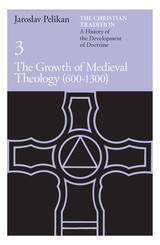
"In this volume Jaroslav Pelikan continues the splendid work he has done thus far in his projected five-volume history of the development of Christian doctrine, defined as 'what the Church believes, teaches, and confesses on the basis of the word of God.' The entire work will become an indispensable resource not only for the history of doctrine but also for its reformulation today. Copious documentation in the margins and careful indexing add to its immense usefulness."—E. Glenn Hinson, Christian Century
"This book is based on a most meticulous examination of medieval authorities and the growth of medieval theology is essentially told in their own words. What is more important, however, then the astounding number of primary sources the author has consulted or his sovereign familiarity with modern studies on his subject, is his ability to discern form and direction in the bewildering growth of medieval Christian doctrine, and, by thoughtful emphasis and selection, to show the pattern of that development in a lucid and persuasive narrative. No one interested in the history of Christianity or theology and no medievalist, whatever the field of specialization, will be able to ignore this magnificent synthesis."—Bernhard W. Scholz, History
"The series is obviously the indispensable text for graduate theological study in the development of doctrine, and an important reference for scholars of religious and intellectual history as well. . . . Professor Pelikan's series marks a significant departure, and in him we have at last a master teacher."—Marjorie O'Rourke Boyle, Commonweal
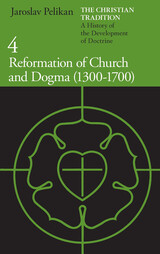
"Only in America, and in this case from a Lutheran scholar, could we expect an examination so lacking in parti pris, a survey so perceptive, so free—and, one must say, the result of so much immense labor, so rewardingly presented."—John M. Todd, New York Times Book Review
"Never wasting a word or losing a plot line, Pelikan builds on an array of sources that few in our era have the linguistic skill, genius or ambition to master."—Martin E. Marty, America
"The use of both primary materials and secondary sources is impressive, and yet it is not too formidable for the intelligent layman."—William S. Barker, Eternity
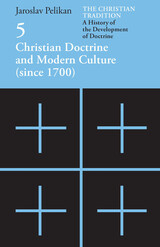
"Knowledge of the immense intellectual effort invested in the construction of the edifice of Christian doctrine by the best minds of each successive generation is worth having. And there can hardly be a more lucid, readable and genial guide to it than this marvellous work."—Economist
"This volume, like the series which it brings to a triumphant conclusion, may be unreservedly recommended as the best one-stop introduction currently available to its subject."—Alister E. McGrath, Times Higher Education Supplement
"Professor Pelikan's series marks a significant departure, and in him we have at last a master teacher."—Marjorie O'Rourke Boyle, Commonweal
"Pelikan's book marks not only the end of a dazzling scholarly effort but the end of an era as well. There is reason to suppose that nothing quite like it will be tried again."—Harvey Cox, Washington Post Book World

The German Romantic theologian and philosopher Schleiermacher wrote, "The virtuosity (or special calling) of a person is at the same time the melody of that person's life, and it remains a simple, meager series of notes unless religion, with its endlessly rich variety, accompanies it with all notes and raises the simple song to a full-voiced, glorious harmony." It is around this melody that Jaroslav Pelikan, a great theologian of our own day, weaves the polyphonic threads of philosophy, theology, morals, history, and personality to create a singular portrait of his life and work.
The Melody of Theology is really two books in one: a dictionary in which a reader can browse through piquant explorations of some of the most interesting topics in Christian theology, and an intellectual autobiography in which Jaroslav Pelikan has used those topics to give an account of the traditions to which he owes the formation of his own mind and spirit. As he says, "An intellectual autobiography in the format of a 'philosophical dictionary' permits the self-indulgence of employing the seeming objectivity of some eighty-two entries, arranged in the impersonal sequence of alphabetical order, to express a completely personal set of prejudices."
Among the large topics addressed in this volume are the Bible, Faith, Grace, Reformation and Renaissance, and Sin. Among the towering figures of religion and theology are Dante, Ralph Waldo Emerson, Erasmus, Gibbon, Martin Luther, Paul the Apostle, and Schleiermacher. Among the technical topics analyzed are Apocatastasis, Christian Creeds, the term "Ecumenical," Eschatology, Patristics, and the Trinity. The Melody of Theology belongs on the bookshelf of anyone who wants to study a history and tradition that precede us and will continue after us, and also of the reader who would like to make the acquaintance of a subtle analytic mind and a generous open heart.
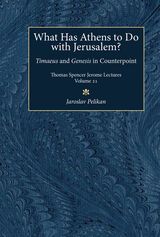
READERS
Browse our collection.
PUBLISHERS
See BiblioVault's publisher services.
STUDENT SERVICES
Files for college accessibility offices.
UChicago Accessibility Resources
home | accessibility | search | about | contact us
BiblioVault ® 2001 - 2024
The University of Chicago Press









